- HR:+91-879-9184-787
- Sales:+91-908-163-7774
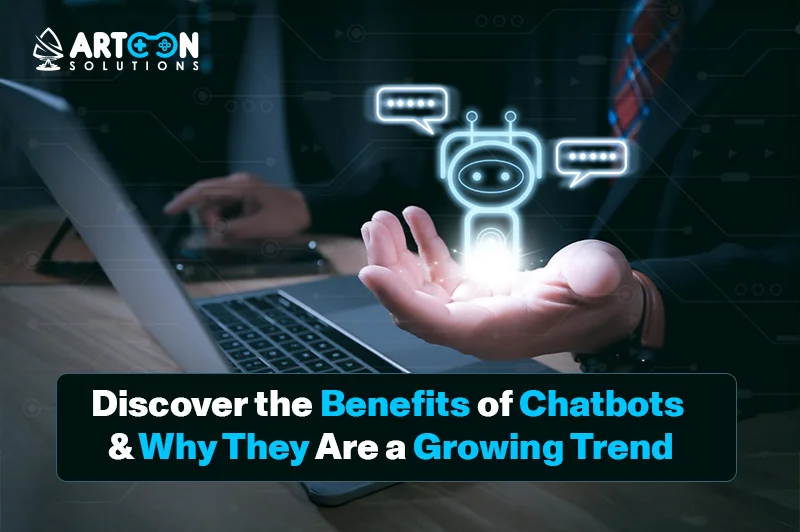
In today’s fast-paced digital world, businesses are under constant pressure to provide quick, efficient, and personalized customer service. Enter chatbots, the AI-powered systems that are revolutionizing the way companies interact with their customers. As AI and the benefits of chatbots continue to evolve, they are becoming more sophisticated and integral to enhancing customer experience, driving sales, and improving operational efficiency.
In this blog, we will explore the benefits of chatbots for businesses, why chatbots are a growing trend, and how they are transforming industries across the globe. Whether you’re considering chatbot services for your company or looking to integrate an AI-powered chatbot for customer service, partnering with an artificial intelligence development company in USA can help you harness the full potential of chatbots. This guide will provide you with everything you need to understand the power of chatbots.
In today’s digital world, chatbots have become an integral part of many industries, transforming how businesses interact with customers, automate processes, and improve overall efficiency. Chatbots are AI-powered software systems designed to simulate human conversation and interact with users via text or voice. These intelligent agents can handle a wide range of tasks, from answering frequently asked questions to guiding users through complex processes.
This article will explore what chatbots are, how they work, and why they have become essential tools for businesses in 2025.
A chatbot is a software application built to simulate a conversation with human users, either via text or voice. The primary purpose of a chatbot is to provide automated responses and interact with users in real-time, making it an effective tool for customer support, marketing, and sales.
Rule-Based Chatbots: These chatbots follow predefined rules and respond to specific commands or keywords. They can only offer responses programmed by the developer.
AI-Powered Chatbots: Unlike rule-based bots, AI-powered chatbots use machine learning and natural language processing (NLP) to understand and respond to more complex queries. They can learn from interactions and improve their responses over time.
Chatbots function by using a combination of artificial intelligence and predefined scripts to interact with users. Here’s a breakdown of how chatbots generally work:
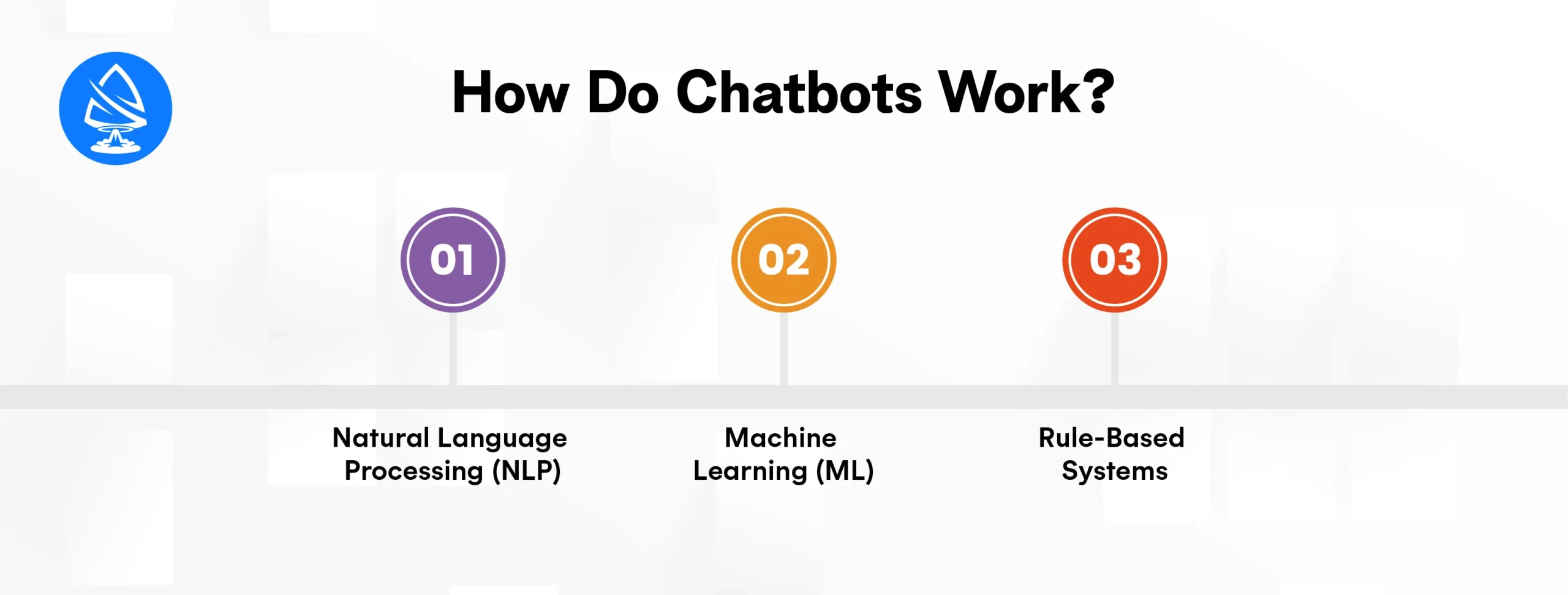
NLP is a branch of artificial intelligence that enables chatbots to understand and process human language in a way that makes interactions more natural and human-like. NLP allows the chatbot to break down sentences, identify keywords, and interpret the meaning behind words or phrases.
Some chatbots, especially AI-powered chatbots, use machine learning algorithms to improve their performance over time. By learning from interactions, these chatbots become better at understanding customer needs and providing relevant responses.
In simpler chatbots, responses are based on predefined rules or keywords. When a user inputs specific words or phrases, the chatbot looks for an exact match in its script and delivers the corresponding response.
Chatbots are rapidly becoming one of the most valuable tools for businesses for several reasons:
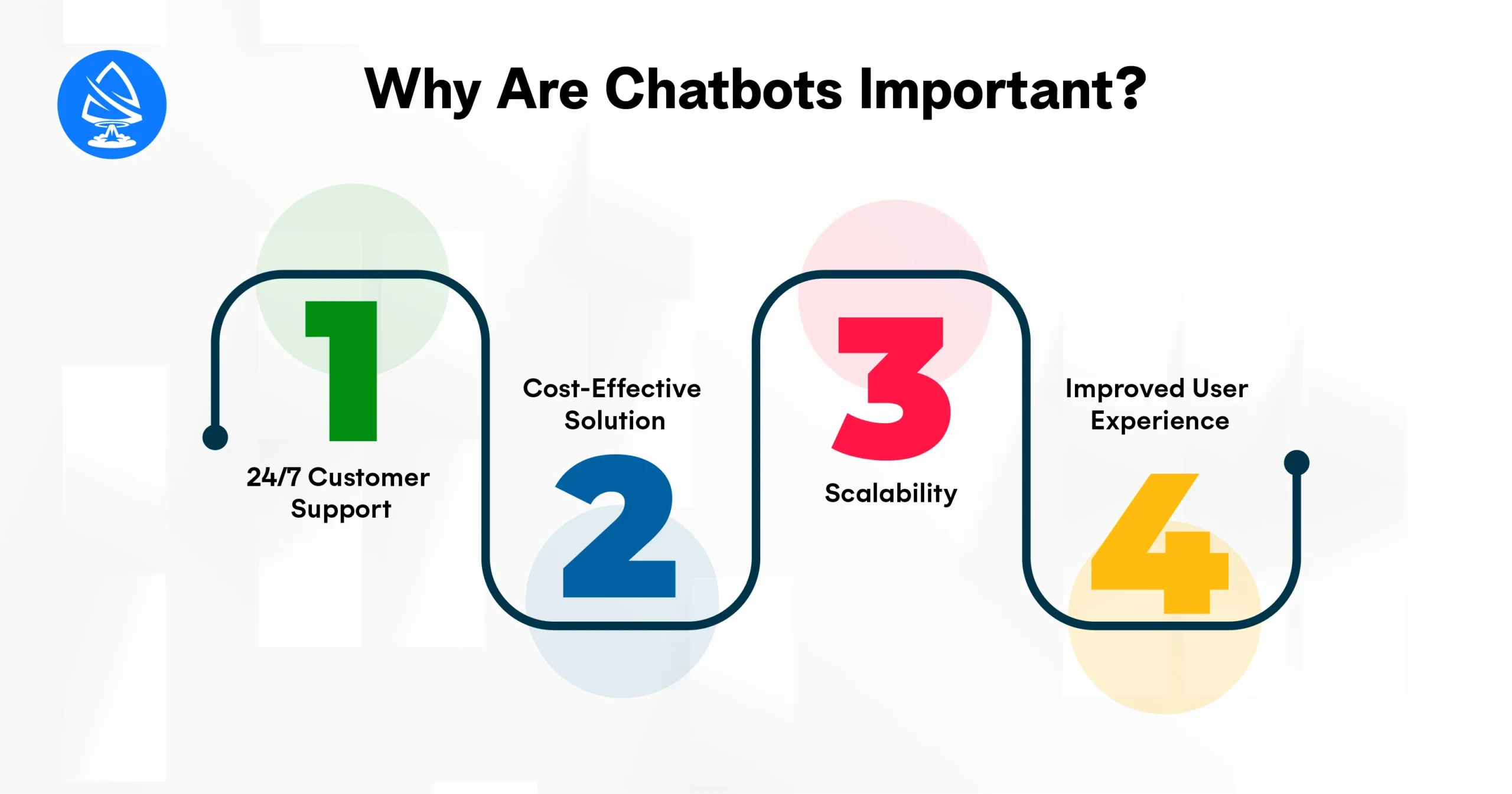
Unlike human customer support agents, chatbots are available 24/7, ensuring that customers always have access to assistance, regardless of time zone differences or working hours.
By automating routine customer interactions, chatbots significantly reduce the need for human agents, leading to cost savings. Chatbots handle large volumes of queries simultaneously, which would otherwise require multiple employees.
As businesses grow, they face an increasing number of customer inquiries. Chatbots can scale to handle thousands of customer interactions simultaneously, without compromising performance.
Chatbots offer users a seamless experience by providing quick responses, personalized interactions, and instant support. This leads to increased customer satisfaction, engagement, and loyalty.
Chatbots are used across various industries to improve customer service, automate tasks, and increase operational efficiency. Here are some key chatbot use cases in business:
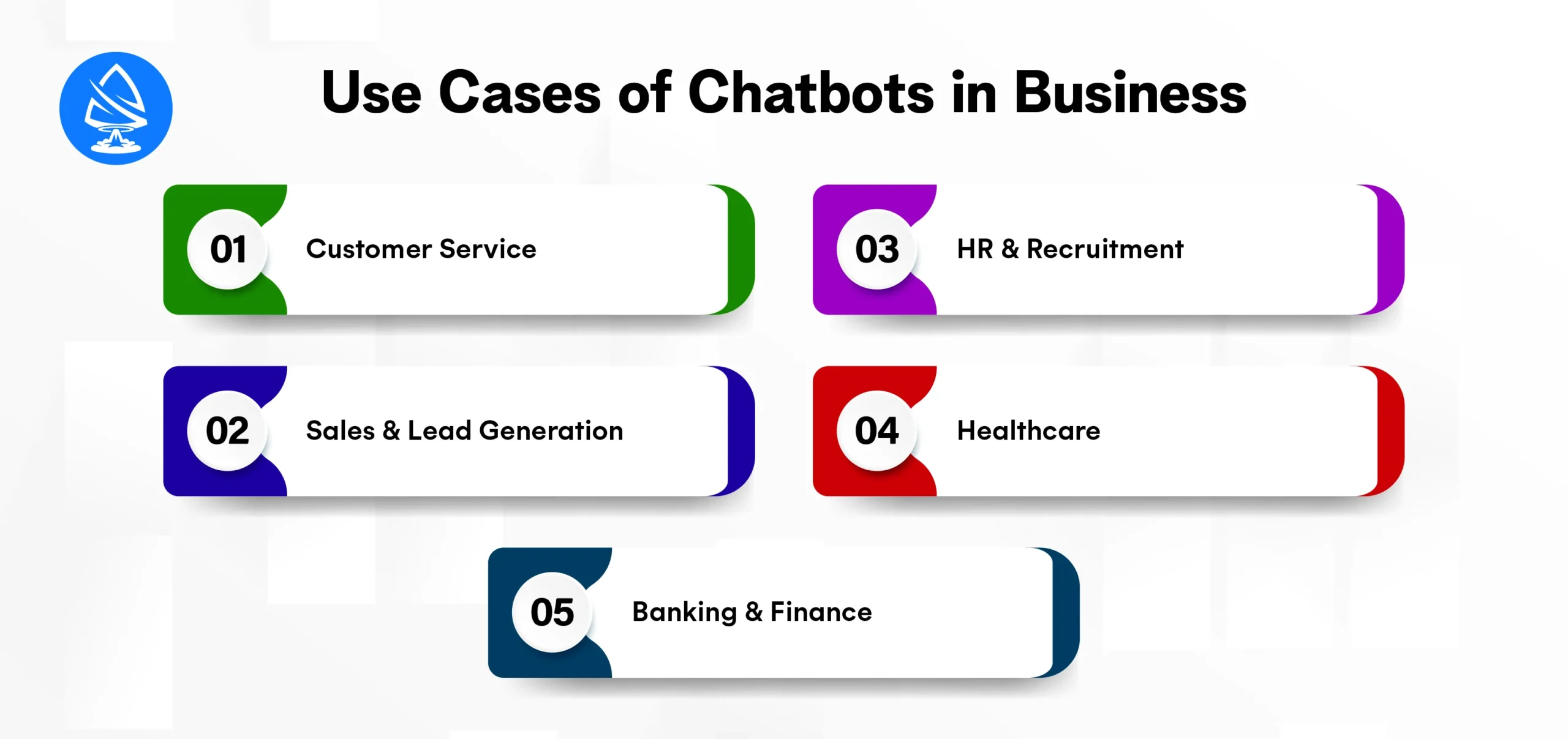
One of the most common uses of chatbots is in customer support. Chatbots can handle common customer queries, solve problems, and provide assistance without the need for human intervention.
AI-powered chatbots can qualify leads, recommend products, and even close sales by guiding users through the purchasing process. They are particularly effective for generating leads in industries like real estate, insurance, and e-commerce.
Chatbots are also being used in recruitment to automate processes such as job applicant screening, interview scheduling, and answering common candidate queries.
In healthcare, chatbots can provide basic medical advice, schedule appointments, and remind patients about their medications or upcoming checkups.
AI-powered chatbots in the banking industry help customers with tasks like checking balances, transferring funds, and processing transactions. These bots can also provide financial advice based on a customer’s spending patterns.
Chatbots offer a wide range of benefits, making them a growing trend in various industries. Here are some of the most significant advantages:
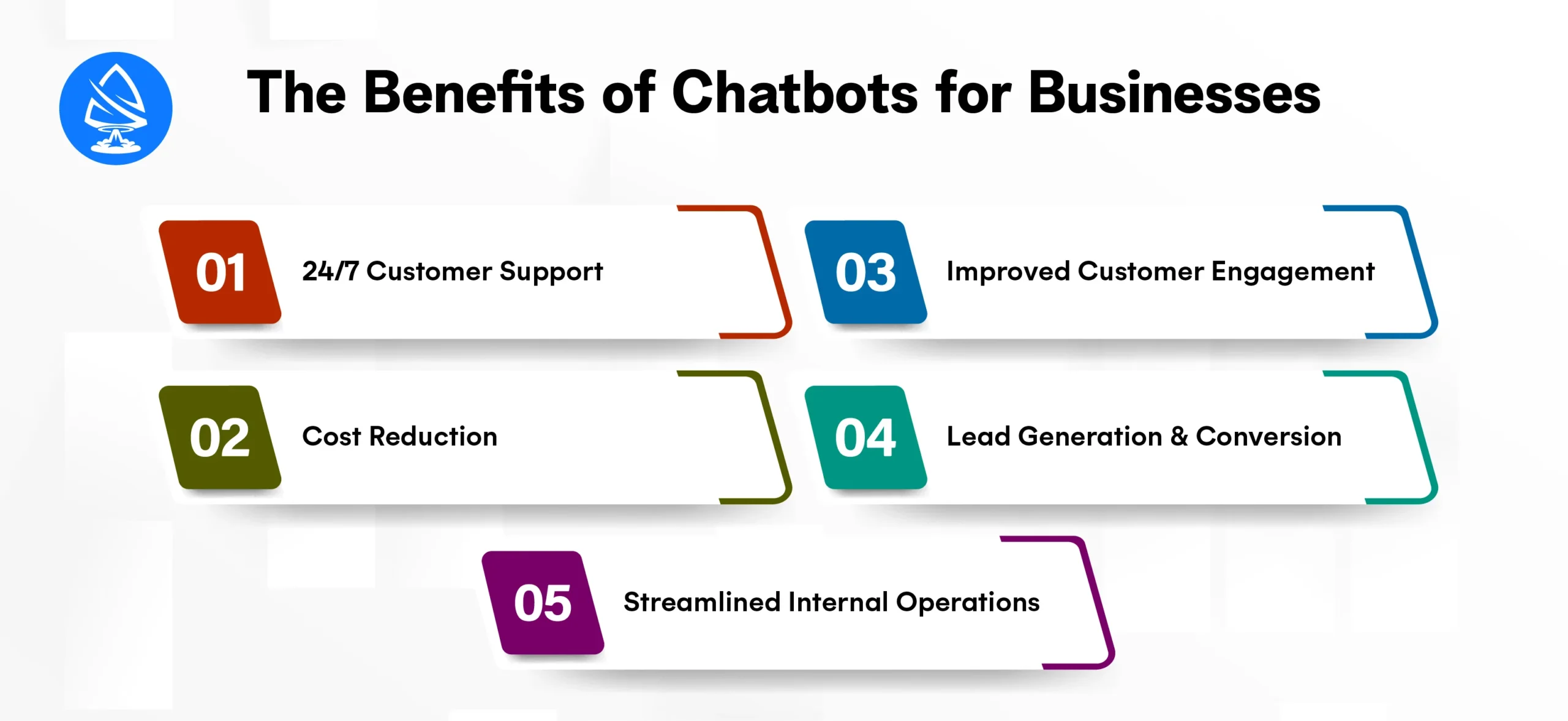
One of the most significant benefits of chatbots is their ability to provide round-the-clock customer support without the need for human intervention. Unlike traditional customer service, chatbots never require sleep, breaks, or holidays, ensuring that your customers have access to support at any time of the day or night.
Example: A chatbot for customer service on an e-commerce site can help customers track orders, process returns, and answer product-related questions at any time.
Implementing chatbot services in customer service can lead to significant cost savings for businesses. By automating routine tasks, chatbots reduce the need for a large customer support team and free up employees to focus on more complex tasks.
Example: A company might implement a chatbot support system to answer basic FAQs, which would otherwise require multiple customer service representatives.
AI-powered chatbots improve customer engagement by offering personalized experiences and providing relevant recommendations based on customer interactions. By analyzing past conversations, chatbots can better understand customer preferences and tailor their responses accordingly.
Example: An AI customer service chatbot on a travel website can recommend vacation packages based on a user’s previous searches or bookings, creating a more personalized experience.
Chatbots are excellent at generating leads and converting them into customers. By interacting with visitors in real time, they can gather information, qualify leads, and even guide customers through the sales process.
Example: A chatbot for companies in the real estate sector can help potential buyers schedule viewings, answer property-related queries, and provide financing options, turning leads into sales.
Chatbots don’t just help with customer interactions; they can also automate internal business operations. AI agents can streamline tasks such as scheduling meetings, managing documents, and providing quick access to information, enhancing employee productivity.
Example: A chatbot for HR can assist employees with tasks like accessing payroll information, checking benefits, or submitting leave requests, freeing up HR professionals for more strategic work.
The rapid adoption of AI-powered chatbots can be attributed to several factors:
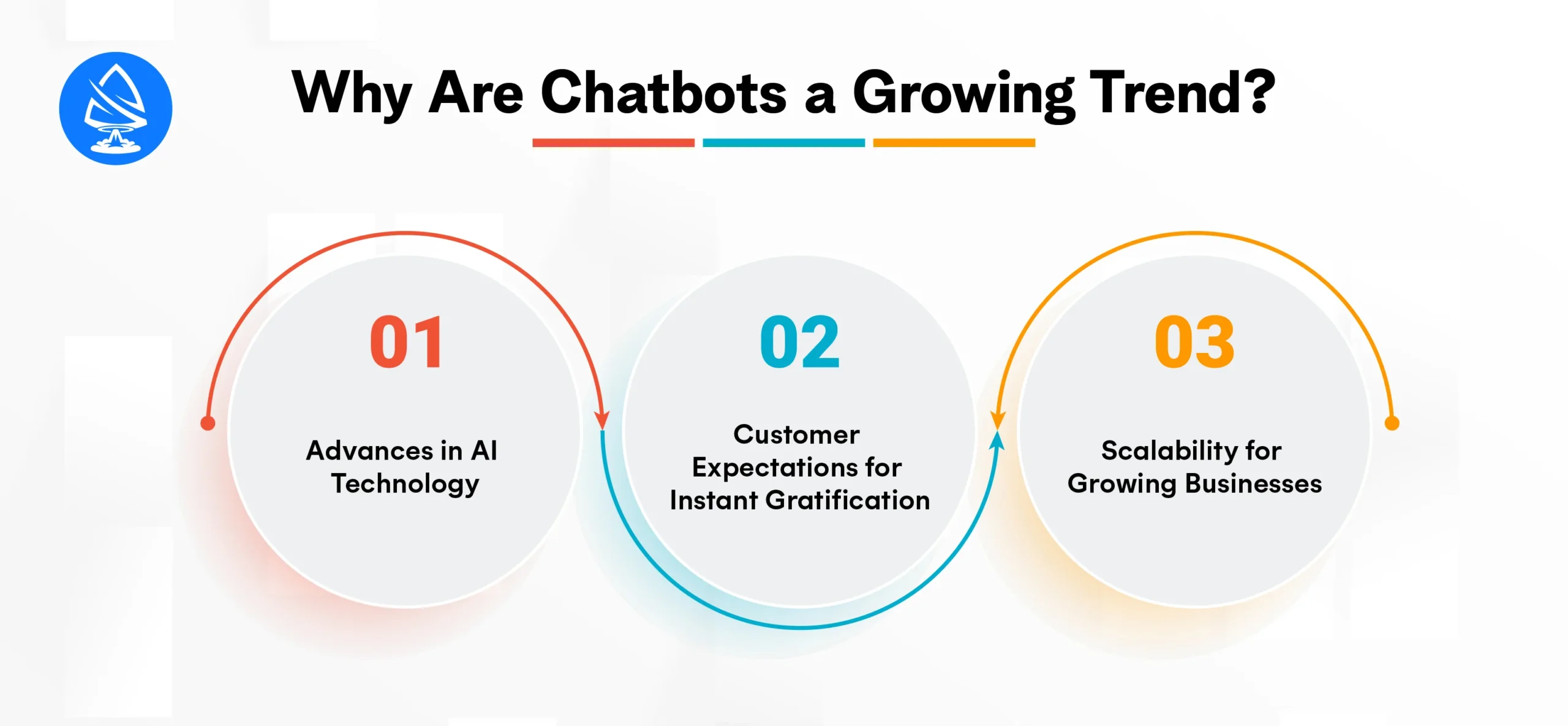
The development of natural language processing (NLP), machine learning, and deep learning has significantly enhanced the capabilities of chatbots. These technologies enable chatbots to understand and process human language with high accuracy, providing more personalized and intelligent interactions.
In today’s fast-paced world, customers expect instant responses and quick resolutions. Chatbots provide a solution to this by offering immediate answers and improving customer satisfaction and engagement.
As businesses expand, handling an increasing volume of customer inquiries can become challenging. Chatbots scale effortlessly, allowing businesses to handle more customers without additional human resources.
AI-powered chatbots have become essential tools for businesses across various industries. By automating customer service, improving engagement, and streamlining operations, AI chatbots offer benefits that are tailored to the unique needs of each sector. Whether it’s providing instant support, collecting data, or recommending products, chatbots are revolutionizing how businesses operate and interact with their customers.
In this article, we will explore how AI chatbots are being used in different industries, highlighting their key applications and benefits.
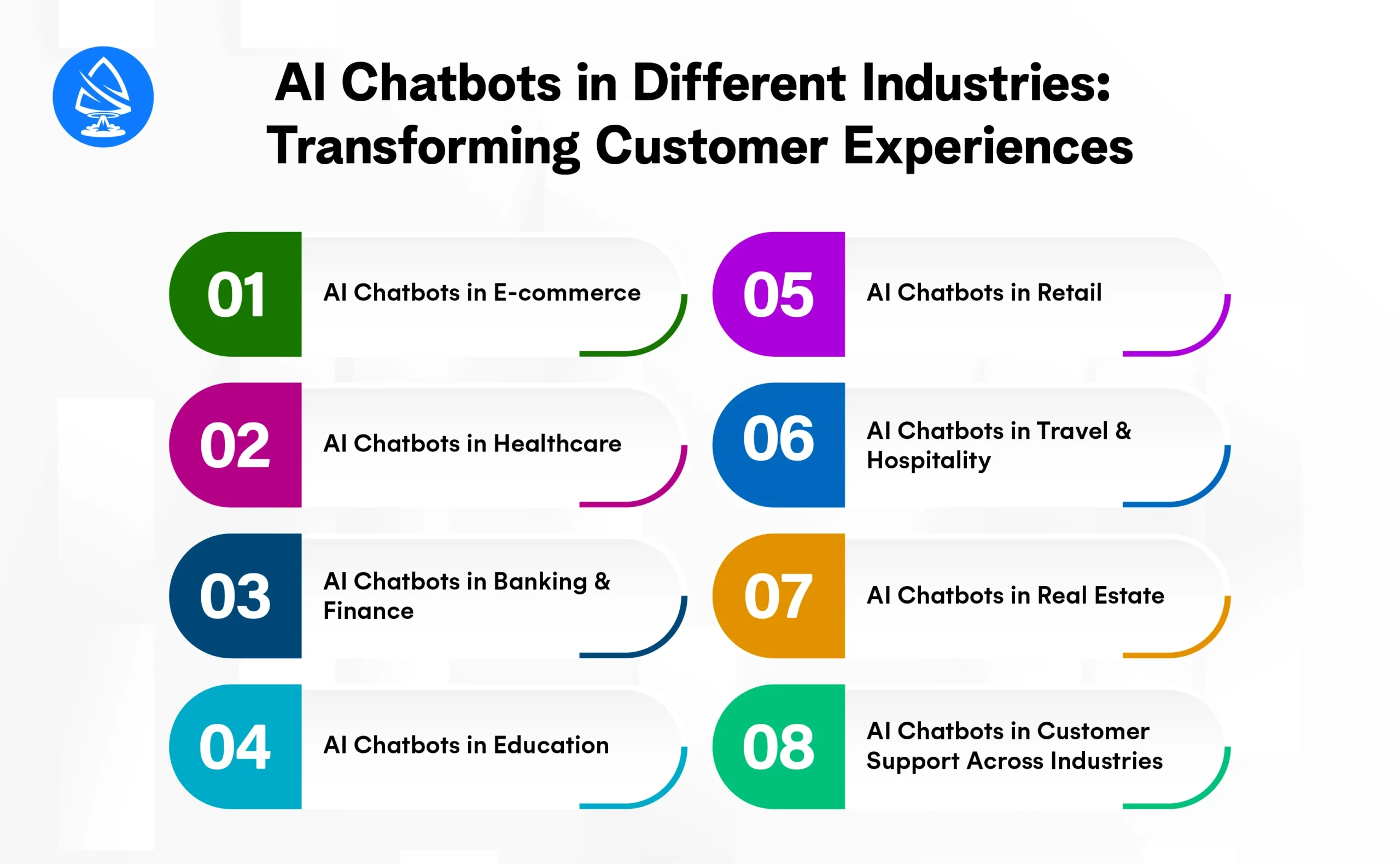
The e-commerce industry has embraced AI chatbots as a powerful tool to enhance customer service and drive sales. Chatbots in e-commerce help businesses engage customers, assist with product searches, and streamline the purchasing process.
Example: Sephora, a global cosmetics brand, uses a chatbot that assists customers in choosing makeup based on their preferences and skin type, providing a personalized shopping experience.
In the healthcare industry, AI chatbots are playing a significant role in improving patient care, reducing administrative burdens, and offering efficient support. From providing information to facilitating appointment scheduling, these chatbots are transforming patient interaction with healthcare providers.
Example: Babylon Health, a digital healthcare service, uses a chatbot to provide virtual consultations, allowing patients to get initial advice and diagnoses from the AI system before seeing a doctor.
In the banking and finance sectors, AI chatbots are revolutionizing how customers interact with financial institutions. Chatbots help customers with routine banking tasks, providing them with 24/7 access to financial services and reducing the need for human agents.
Example: Bank of America offers an AI-powered chatbot, Erica, which helps customers with tasks like balance checks, transaction inquiries, and financial recommendations, making banking more accessible.
In the education sector, AI chatbots are enhancing the learning experience, making education more accessible and interactive. They help students by providing personalized learning support and assisting educators with administrative tasks.
Example: Duolingo, a popular language-learning platform, uses a chatbot to teach languages through conversations, making learning interactive and engaging.
Retail businesses are increasingly relying on AI chatbots to deliver personalized shopping experiences and improve customer engagement. These chatbots help guide customers, answer questions, and offer personalized recommendations, ultimately driving sales.
Example: H&M, a clothing retailer, uses a chatbot that assists customers in finding the right clothes based on size, style, and budget, offering a personalized shopping experience.
The travel and hospitality industry has seen tremendous benefits from AI chatbots that handle booking inquiries, provide real-time flight information, and guide customers through their travel journey.
Example: Skyscanner and Expedia use AI-powered chatbots to assist travelers with flight bookings, hotel reservations, and personalized travel recommendations.
In the real estate industry, AI-powered chatbots are transforming the way agents interact with clients. Chatbots help streamline the process of buying, selling, and renting properties, providing immediate assistance and personalized information.
Example: Zillow and Realtor.com use chatbots to help users find homes, schedule viewings, and get answers to common property-related questions.
Across virtually every industry, AI chatbots are helping businesses provide customer support more efficiently. Whether in retail, healthcare, banking, or real estate, these bots can resolve common queries instantly, improving customer satisfaction and reducing the burden on human agents.
Example: Zendesk offers AI-powered chatbot services that can integrate into existing customer service workflows, helping businesses enhance customer support and reduce operational costs.
The benefits of chatbots are undeniable in today’s business landscape. With AI-powered chatbots transforming customer service, improving efficiency, and driving sales, businesses that adopt this technology can enhance their competitive edge. From cost reduction and 24/7 support to improved customer engagement and lead generation, chatbots are revolutionizing how companies interact with customers and manage internal operations. As the technology behind chatbots continues to evolve, they will only become more sophisticated and indispensable for businesses of all sizes. If you’re looking to integrate chatbots into your business, hire AI developers to create customized solutions tailored to your needs.
The benefits of chatbots include 24/7 support, cost reduction, personalized experiences, lead generation, and improved customer engagement.
AI-powered chatbots use natural language processing (NLP) and machine learning to understand and respond to customer queries, providing intelligent and relevant answers.
Yes, chatbots offer instant responses, personalized interactions, and 24/7 support, significantly improving the customer service experience.
Absolutely! Benefits of Chatbots can handle an increasing number of interactions without requiring additional resources, making them highly scalable for growing businesses.
Chatbots for companies can interact with potential customers, qualify leads, and guide them through the sales process, increasing the likelihood of conversions.
Chatbots are used in various industries, including e-commerce, healthcare, banking, travel, and hospitality, to improve customer support and automate operations.
AI-powered chatbots are increasingly sophisticated and can handle more complex queries, especially when using advanced machine learning models and natural language processing.